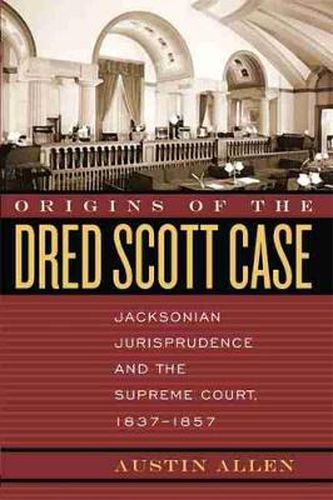Readings Newsletter
Become a Readings Member to make your shopping experience even easier.
Sign in or sign up for free!
You’re not far away from qualifying for FREE standard shipping within Australia
You’ve qualified for FREE standard shipping within Australia
The cart is loading…






The Supreme Court’s 1857 Dred Scott decision denied citizenship to African Americans and enabled slavery’s westward expansion. It has long stood as a grievous instance of justice perverted by sectional politics. Austin Allen finds that the outcome of Dred Scott hinged not on a single issue - slavery - but on a web of assumptions, agendas, and commitments held collectively and individually by Chief Justice Roger B. Taney and his colleagues. Allen carefully tracks arguments made by Taney Court justices in more than 1,600 reported cases in the two decades prior to Dred Scott and in its immediate aftermath. By showing us the political, professional, ideological, and institutional contexts in which the Taney Court worked, Allen reveals that Dred Scott was not simply a victory for the Court’s prosouthern faction. It was instead an outgrowth of Jacksonian jurisprudence, an intellectual system that charged the Court with protecting slavery, preserving both federal power and state sovereignty, promoting economic development, and securing the legal foundations of an emerging corporate order - all at the same time. Here is a wealth of new insight into the internal dynamics of the Taney Court and the origins of its most infamous decision.
$9.00 standard shipping within Australia
FREE standard shipping within Australia for orders over $100.00
Express & International shipping calculated at checkout
The Supreme Court’s 1857 Dred Scott decision denied citizenship to African Americans and enabled slavery’s westward expansion. It has long stood as a grievous instance of justice perverted by sectional politics. Austin Allen finds that the outcome of Dred Scott hinged not on a single issue - slavery - but on a web of assumptions, agendas, and commitments held collectively and individually by Chief Justice Roger B. Taney and his colleagues. Allen carefully tracks arguments made by Taney Court justices in more than 1,600 reported cases in the two decades prior to Dred Scott and in its immediate aftermath. By showing us the political, professional, ideological, and institutional contexts in which the Taney Court worked, Allen reveals that Dred Scott was not simply a victory for the Court’s prosouthern faction. It was instead an outgrowth of Jacksonian jurisprudence, an intellectual system that charged the Court with protecting slavery, preserving both federal power and state sovereignty, promoting economic development, and securing the legal foundations of an emerging corporate order - all at the same time. Here is a wealth of new insight into the internal dynamics of the Taney Court and the origins of its most infamous decision.